Game 6 WCSF AfterThoughts: Sorrow and Joy
Fortune's wheel turned again
You will hear the shrillest highs
And lowest lows with the windows down
When this is guiding you home
***
Grief isolates you. You feel cut off from the connective tissue of your community, of life, and even your memories of happiness.
At the end of every playoff series, you see both ends of Fortune’s Wheel at once, one team rising (though they might still fall), and another team plunged to the depths of despair. Never did you see that contrast more starkly than Saturday night in Dallas.
Thomas Harley turned around and jumped for joy, exploding off the ice because he couldn’t not try to reach the heavens. And he met his friends at the gates of that delight.
“It happened pretty quick. I do remember jumping up pretty high,” Harley said afterwards. “I think I beat my record at training camp with that one.”
Mark Scheifele hung his head in the penalty box, shoulders slumped in a way athletes are taught never to do. But Scheifele, at the last, was not an athlete. He was a man with a broken heart, until he was pulled out by his teammates, desperate to console him, to show him he was loved.
“We're a family,” said Neal Pionk of bringing their teammate back from the box. “Scheif’s a big part of our family, and we’re here for him no matter what. So that's a ‘we weren't leaving the ice without him’ kind of thing.”
Grief makes you think nobody understands what you’re going through, that you should be alone, that all joy is only going to lead to despair, eventually. Everything seems hollow, and even close friends may not know how to comfort you, because you don’t even know what would help.
It’s true what they say: when you lose a close friend or family member, you don’t only lose that friend; you lose everything they brought with them, the way that other people would light up in their presence, or the way you and someone else could bask in their presence, together witnessing what made that person unique or bizarre, beautiful or preposterous. Real family and friends are catalysts, multiplying their impact many times over through all the other people their life has illuminated.
And when they’re gone, those lights all seem to go out. You wouldn’t have known those reflections were there before you knew that person, but you can absolutely see the darkness when they’re gone. The parts of other people they brought to life may never be lit up again, and you can sense it almost immediately. One death might bring many more in its wake.
Only Mark Scheifele knows exactly what yesterday was like, and I’m sure he couldn’t put most of it into words, and would never want to try. But in his grief, he chose to be there for his teammates, to illuminate their lives as best he could, and you have to admire the incredible courage and selflessnes that took. Because you saw what he was really feeling when the game finally ended, and the burden was heavier than anyone could know.
But you also have to be glad for Scheifele in a smaller sense, because even that feeling of being in the penalty box when the series ended would have paled in comparison to the feeling of not having been there at all when the series ended. In fact, he was only in the penalty box in overtime because he had scored, because he had dragged his team as far as they’d gotten. He had been there for them.
Those embraces at the end of the game cannot take away most of the pain Scheifele is feeling, but they don’t need to, and players like Mason Marchment well understand that true care and empathy aren’t intended to rewrite pain, but only to reveal that there is still connection, still hope, even in that darkest of places. I have been there, too. And there is a path back out of there, when you’re ready for it.
Joy and sorrow coexisted Saturday night. But when you understand the nature of being human, even those opposites are not cut off from each other completely. There is love, always.
I’m driving down to Cedar Park today to watch the Texas Stars attempt to take a 2-0 lead in their second round series against their own version of the Edmonton Oilers in the Milwaukee Admirals. It should be a fantastic game, as Milwaukee has eliminated Texas in each of the last two years, including a reverse sweep after Texas took a 2-0 lead last year.
As for Dallas, the Stars have a tall task ahead of them: beating the Edmonton Oilers. This is the same team that rolled over Vegas like they were Carson City, that ended a Los Angeles GM’s tenure with a snap of their fingers after just one coaching slip-up. These Oilers have had to do the blue line makeover worth of Colorado’s goaltending, as Jake Walman and John Klingberg have stepped in to play 20+ minutes a game for a team suddenly without Mattias Ekholm, at least for now.
Of course, the Stars know what it’s like to lose a key blueliner or three. But they finally have Miro Heiskanen back, as his playing nearly 24 dominant minutes in Game 6 shows.
Heiskanen also looks to have taken over the top power play unit again, which is something that will certainly generate a lot of discourse in the coming days. Harley was unquestionably fantastic as the PP1 quarterback this year, but teams usually have a rule about “not losing your spot because of an injury” that was always going to complicate matters.
“He’s definitely on the power play,” DeBoer said of Heiskanen before the game. “I don’t know if he’ll be top power play or second. It’s just going to depend. He started on the second unit last game, I think in the third he ran the first unit, the one power play. I think we’re just going to roll who we think is going. Some of that is in-game decisions.”
This in-game decision saw Heiskanen come out with the top guys to start overtime on the first power play of the hockey game. But it was only after Harley got on the ice for the last 30 seconds of the power play that Dallas scored, which can’t have been lost on anyone in that organization.
Yes, Heiskanen is a world-class player, and he is more than capable of running a successful power play. But the Stars’ power play with Harley, as Pete DeBoer said last night, is one of the biggest reasons (along with Jake Oettinger and the penalty kill) the Stars have made it this far. Their power play is sizzling at a 31% conversion rate in the postseason, and the goals have been distributed as perfectly as you could ask for, with seven critical power play goals in the first round and five in six games of the second round. Toy with that chemistry at your own peril.
But Fortune’s Wheel reminds us that Dallas also scored five power play goals in the second round last year before Edmonton suddenly unplugged the man-advantage entirely. So every bit of the power play is going to be scrutinized in the Western Conference Final until the Stars show those demons are duly conquered. And switching out a wildly successful quarterback on Saturday night is always a move that gets questioned Monday morning.
Don’t lose sight of how critical the power play has been, not even for a minute. The Stars don’t get past Colorado without late power play goals from Mikko Rantanen and Wyatt Johnston, remember. And the Stars might have been forced back to Winnipeg for a Game 7, had Sam Steel not drawn the power play that set up Harley’s heroics.
Mark Lazerus pointed out last night that Steel is quite literally the only forward of the 11 Dallas put out there yesterday who isn’t a particularly dangerous scorer.
Or at least, not usually dangerous.
“He’s been awesome all year long. Whatever’s been asked of him, he’s done it. He’s done it great. And tonight, he stepped up big time. Huge goal and drawing the penalty at the end there is obviously a great play, but it’s the little things that he does that he doesn’t get credit for. It’s the plays on the wall. It’s his defensive work, his work on the PK, and for him to get rewarded like that, it’s awesome to see.”
-Thomas Harley on Sam Steel, 5-17-25
The playoffs are so thrilling because even a depth player might have the biggest moment. And I’ll still be slightly annoyed that we were robbed of a moment that would have lived in Stars lore forever, had Steel been given the penalty shot he earned last night. I can’t even imagine what it would have been like, had he scored a penalty shot goal on Hellebuyck with 15 seconds left. That’s like packing all three Joel Kiviranta goals into one concentrated vial and tossing it back like you’re Dr. Jekyll on ice. What a moment that would have been.
Steel also scored, in case you forgot, doing his best Antti Miettinen (also a former Jet) impression to score the only Dallas goal in regulation in order to get a Game 6 to a dramatic overtime. So it’s not like Steel was entirely deprived of heroism.
After the game, Steel said it was “probably a good thing” the penalty shot wasn’t given as he was tired, and the ice was bad. No respect for cinema, that man. But he still made the shot block that led to the penalty in the first place, and isn’t a shot block just the perfect sort of bookend to Steel’s tying goal, in a way?
The last thing I’ll say about the penalty shot: do you remember that Leo Carlsson penalty shot awarded a couple of months ago? It’s just insane that we saw that get a penalty shot, while a situation that would have been an awarded goal with the net empty saw a veteran referee find a way to rationalize the more prosaic call.
I suppose we got more than enough drama in the end, though.
Dallas played their best game of the series in Game 6 (if you don’t penalize them for missing wide-open nets), but surprisingly, it wasn’t the biggest names creating the most chances.
Scheifele really did drag his team into the fight, and both teams were checking hard, with the game only opening up for small stretches at a time, like a diaphragm expanding for short breaths after being held underwater for long stretches.
That Josh Morrissey injury really was horrible. I can’t imagine how bitter a pill this will be, his having to go an entire offseason while rehabbing his own version of Miro Heiskanen’s knee injury, knowing the timing was about as bad as it could possibly have been. Then again, the Stars almost did know how bitter a pill that was, if not for Mikko Rantanen’s heroics in Game 7.
It was nearly the Duchene line’s heroics in Game 6, this time. Tyler Seguin missed an open net on the backhand, but he did not miss Harley’s tape in overtime, and that has got to feel good for a player whose repaired hip is holding up better with each successive round. The Stars are so much better with Tyler Seguin, for many reasons.
Also, man. Dylan Samberg just could not have been in a worse spot on that goal. Hellebuyck had peeked over the 6-foot-4 defender’s right shoulder and spotted Harley, then he inched to his left, assuming Harley would follow the pass’s momentum and fire it into the far side.
Instead, Harley went back against the grain just before the goaltender’s vision got to the left of Samberg, and Hellebuyck never had a prayer. Samberg had started to go behind the net to shut down Seguin, but he realizes he won’t get there in time, and he stops and turns to head back to the point, not realizing that Harley will have crept down far enough to catch Samberg in the absolute worst spot at the worst time.
Samberg will be thinking about this all summer. He really would have been better off just leaving Harley all alone and asking Hellebuyck to be the hero. Instead, he was the equivalent of a superhero’s cape that gets caughed in a jet intake.
Dallas will go back to a regular 12/6 lineup, one would have to think. Alex Petrovic played just nine minutes in this game, and he and Lian Bichsel were on the ice for the only goal Winnipeg scored—though it was a breakdown and turnover by Steel and Dadonov up the ice that precipitated the whole thing, as it gave Winnipeg a breakaway during a Dallas change that never really got sorted out.
It’s easy to forget that Oettinger actually stopped Nik Ehlers on a breakaway just before Scheifele’s goal.
The Jets would eventually score, but we talked about that last night. Instead, I just wanted to give Oettinger credit for making this big stop—which was surely much easier without a defender standing in front of him.
As for Oettinger’s biggest stop, what can you say? The goalstick is probably coming out of his blocker hand even before he gets across to cover what small part of the open net he can. But Mason Appleton flubbed the shot, and Oettinger turned out to be in the right spot.
There are a variety of ways Oettinger could have put that puck into his own net.
If Oettinger takes a second and pushes across, the puck may bank off him and in. Or come right back out for Appleton to try again. But instead, Oettinger gets the skinny part of his goalstick just between the puck and the goal line, and the Stars never had to go all-out to get a tying goal late against an incredible defensive team, when they probably never would have gotten a power play. Incredible stuff.
We’ll talk more about the next series, but for now, just revel in what the Stars have done. Colorado and Winnipeg both looked massively superior to the Stars in multiple games during the regular season. Heck, both of them shut out the Stars 4-0 during the playoffs, and the Jets did it twice! But you could hear the admiration in both Jared Bednar and Scott Arniel’s voices after each series: the Stars are a team that just kind of dares you to try to beat them over the long haul.
Dallas won a track meet with Colorado, and they won a 2-1 overtime game. They weathered Hellebuyck’s resurgence, only to show it still wasn’t enough to outlast the likes of Sam Steel and the Stars’ second power play unit.
Maybe that’s because the Stars’ second power play unit can feature the top center available at the trade deadline in Mikael Granlund, Tyler “Tyler Seguin” Seguin, Thomas Harley, Mason Marchment, and Jason Robertson. That is their second power play unit, if the same holds true next round.
The first unit, well, you know who’s there. Wyatt Johnston (who wasn’t needed for Game 7 heroics, mercifully) and Mikko Rantanen are only two of the names, but they’re more than enough to tell you how deep Dallas is, how ridiculous this forward group is.
Edmonton is a daunting for, but so is Dallas. They have had the hardest path to the third round of any team left. That will either have worn them down or galvanized them, and we will begin to see on Wednesday which is the case.
But Mason Marchment deserved a special call-out from Pete Deboer after the game, so let’s end on him. Because he had a really great game last night—despite being moved off the Duchene line again—that featured both a great hit on Nik Ehlers and a massive play on the power play to set up Harley's goal.
First, Marchment sent Harley’s pass right at Hellebuyck as the Stars entered the zone. Hellebuyck had to body the puck into the corner, and I’m sure the Stars talked all series about how puck-handling was not Hellebuyck’s forte. Marchment fired it at Hellebuyck, and then he did what his linemates know he can do along the boards, beating his man to the right spot.
Here’s Marchment of the far left, at first, with the puck down low as Granlund pursues it.
Then he jumps past his man and behind the referee, and he digs the puck out of his skates and forks it down low, where Seguin is coming out from behind the net.
And you know what happened next.
Marchment is that best of forecheckers, jabbing at the puck and wrestling with smaller players to get the pill back so that players with with elite scoring vision in Tyler Seguin—his linemate during that line’s scorching-hot start to the year with Duchene. And Seguin did what he has done for two seasons now, and took Marchment’s fantastic coal mining along the boards and turned it into a diamond on the scoreboard. With some forwards, there is chemistry. With them, then there is alchemy.
So, it was fitting that Marchment shared some words of comfort with Scheifele at the end of the game, with Marchment having lost his own father far too soon just a couple years ago. Both of those men know the highs and lows of hockey, and of life. And you never really can predict when things will be at their darkest or their brightest. All you can do is be there for your fellow man when he needs you, and share the path you’ve found.
It is always darkest before the dawn.



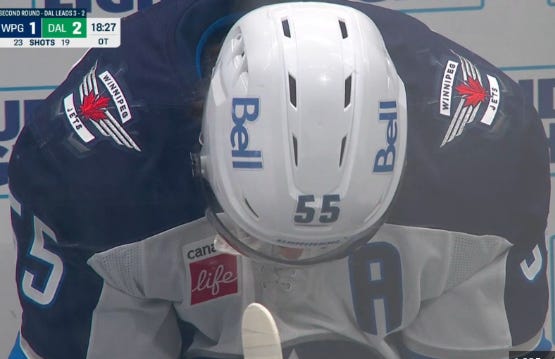


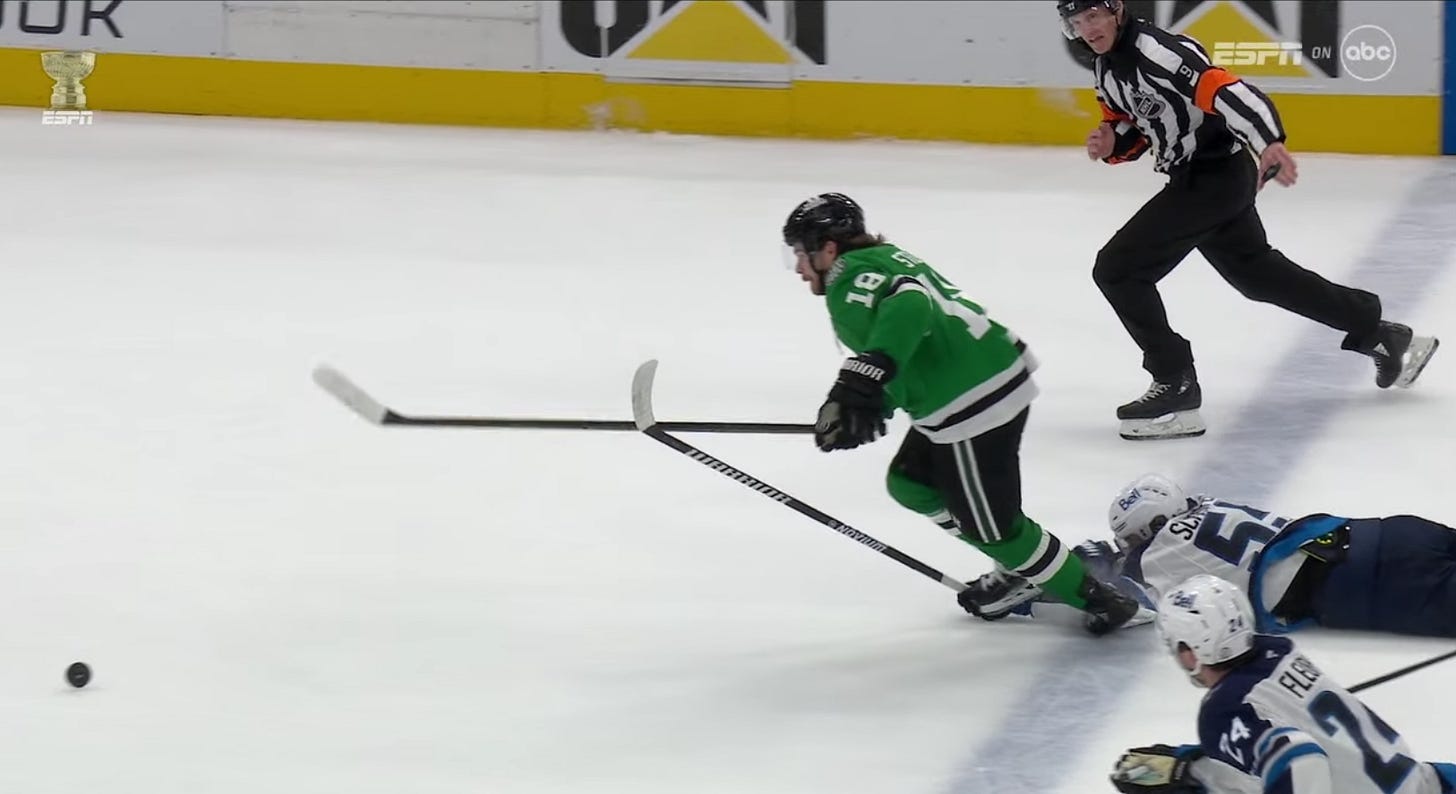
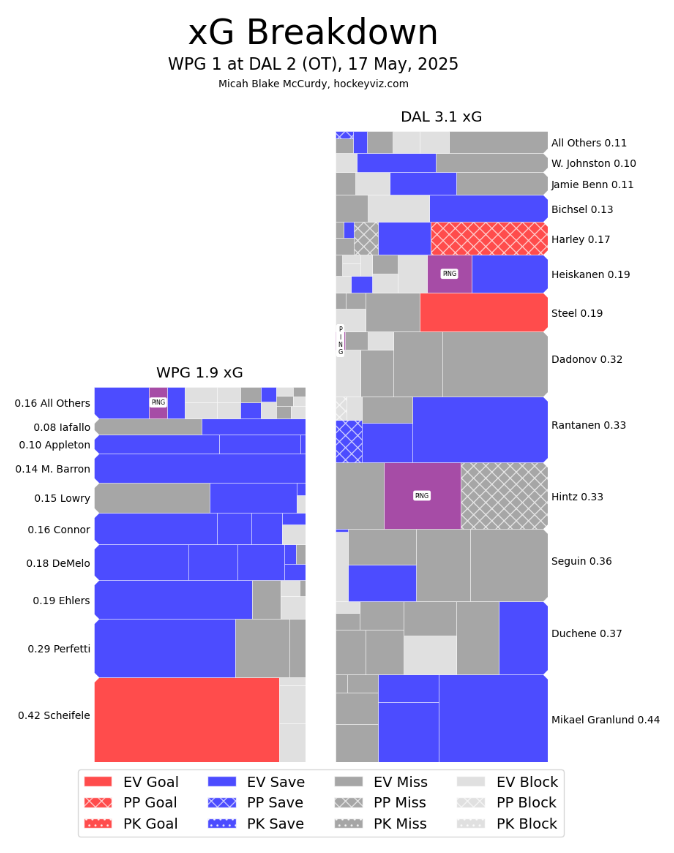

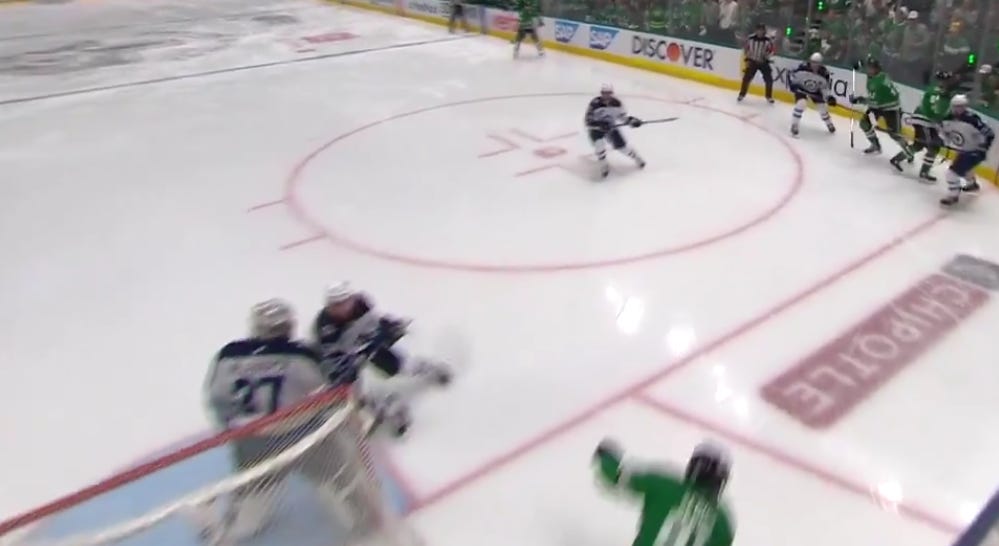


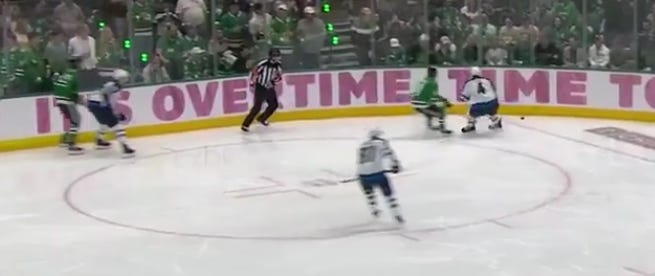

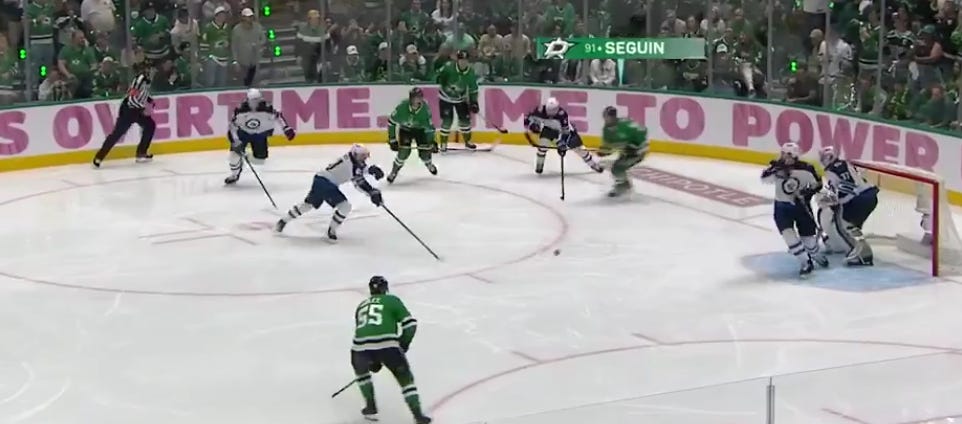
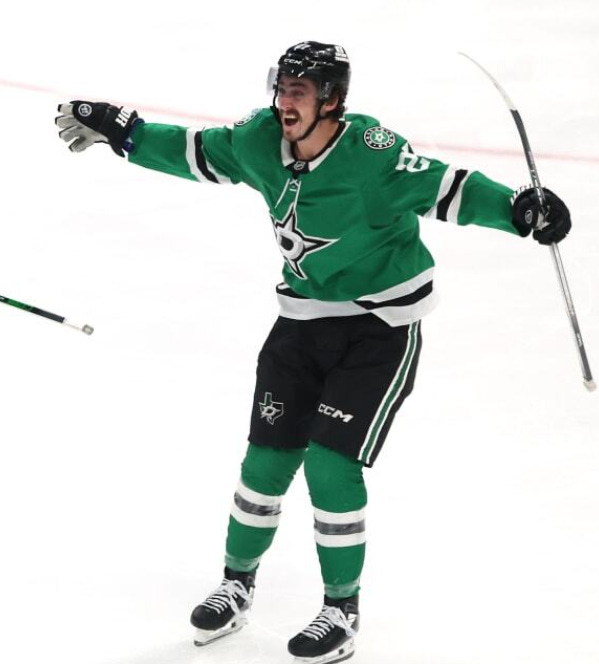
Robert, this piece is so, so special. This transcends sports writing. I lost my dad at 25 and what you have to say about grief here is beautiful and true. Thank you for loving the Stars and sharing your gift with us.
really moving piece. encapsulates the highs and lows of hockey, and humanity. you simply never miss! thank you for all the a+ coverage